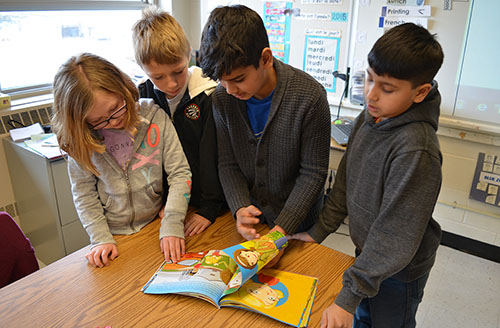Student hands shoot up as local Saskatchewan farmer, Kim Gerencser asks what agriculture looks like at home for them.
“You can grow stuff in a garden. Last year I grew peas and strawberries,” said student Georgie Allan.
“I have my own raspberry bush in my backyard,” said Lukas Rotheisler.
Schools across Saskatchewan are participating in Canadian Agriculture Literacy Week, Feb. 28 to Mar. 5. Presentations are delivered by volunteers with firsthand experiences on the farm. They share their personal stories about how agriculture impacts their daily lives.
When the Grant Road School Grade 3/4 class was polled, half the students had only a distant connection to a farm and the other half had no connection at all.
“My grandmother grows tomatoes, zucchini, carrots, peas. She has a huge garden,” said Sophia Mitchell.
“My mom grew up on a farm. She worked on the farm when she was a kid,” said student Denver Arcaya.
“I wanted to take part in Agriculture in the Classroom for awhile. I couldn’t delay anymore, so I got a hold of them,” said guest presenter Gerencser, who also grew up on a farm.
“I appreciate the fact that most of these students are an open book and are open to soaking up the information… We need to take a positive stance and reach out to a young generation that is so disconnected from the farm,” said Gerencser.
His presentation consisted of reading a story, What’s Growing Around Us?, to the class, followed by a discussion. Gerencser also showed the class pictures of historical farms versus modern day farms.
Canadian Agriculture Literacy Week is developed for grades 2 through 5. Gerencser said he would like to see high school classes included as well.
“I would like to get in front of some grades 9 through 11, who have more of their own ideology already and want to challenge me on some of the news and rhetoric that’s out there. There’s a lot of anti-science, anti-agriculture movements in North America right now and they’re spreading a lot of misinformation. Having an open discussion is what I’d welcome,” said Gerencser.
Agriculture in the Classroom is the charity responsible for 176 classroom presentations taking place in and around Regina. The charity fosters agriculture education and awareness in the province with support from the Ministry of Agriculture.
“It helps kids to put a face to the producers that grow their food,” said program manager Jenna-Lee Morin.
The program helps students think about and understand agriculture practices.
The program “is important to help teachers make a connection and a resource with local producers. It covers a broad spectrum of areas. We’re all connected to agriculture and we all eat,” said Morin.
“We’re creating an opportunity, creating the experience in the class,” Ewert-Molesky said, the Grade 3/4 teacher at the Grant Road School. She contacted Agriculture in the Classroom to get her class involved.
Her class has also been accepted to take part in the Little Green Sprouts Program, also sponsored by Agriculture in the Classroom, later this spring. The program allows students to grow microgreens right in the classroom.
“The students are sensitive. You live it and they learn it,” Ewert-Molesky said.
“(Agriculture) is an incredible industry,” Gerencser said. “What I take away from this is more drive to continue to share this message and spread it across as many different schools as we can and as many young minds as we can. The factual, positive image of agriculture and not the cynical and negative image that is so available right now online and in the media.”
Gerencser said he will continue to volunteer and hopes to become more involved with all ages.


